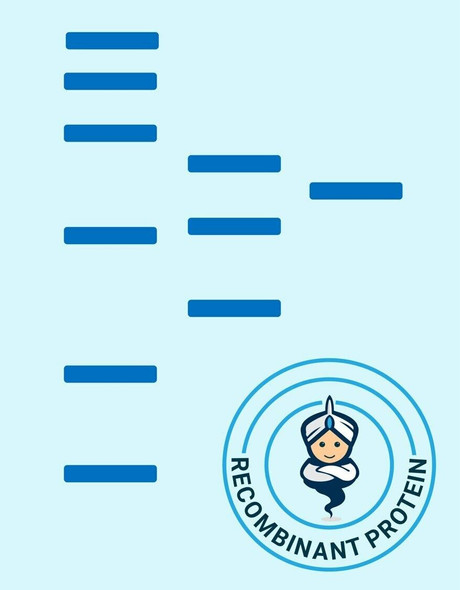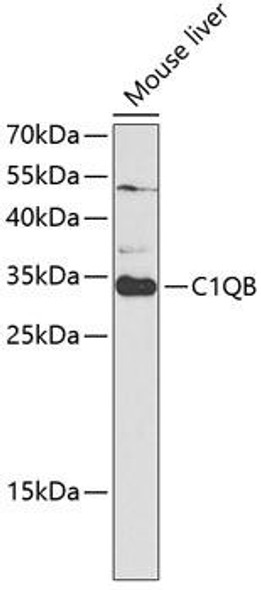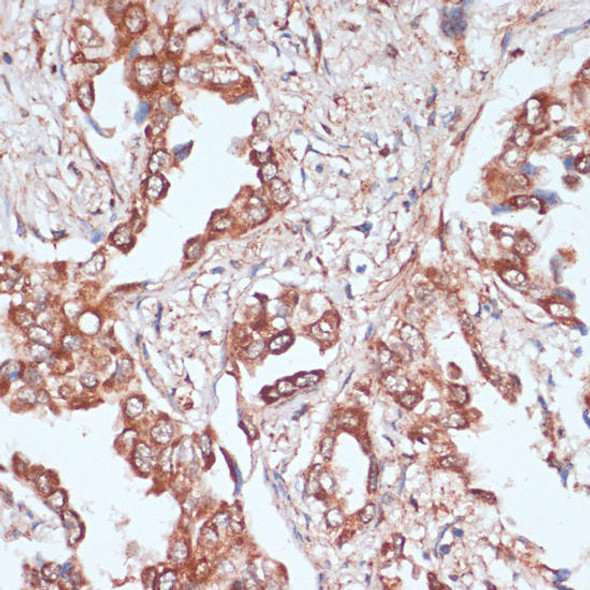Anti-Butyrylcholinesterase Antibody (CAB8861)
- SKU:
- CAB8861
- Product type:
- Antibody
- Antibody Type:
- Monoclonal Antibody
- Reactivity:
- Human
- Host Species:
- Rabbit
- Isotype:
- IgG
- Synonyms:
- CHE1
- CHE2
- E1
Description
| Product Name: | Butyrylcholinesterase Rabbit mAb |
| Product Code: | CAB8861 |
| Size: | 20uL, 50uL, 100uL |
| Synonyms: | CHE1, CHE2, E1 |
| Applications: | WB |
| Reactivity: | Human |
| Host Species: | Rabbit |
| Immunogen: | A synthesized peptide derived from human Butyrylcholinesterase |
| Applications: | WB |
| Recommended Dilutions: | WB 1:500 - 1:2000 |
| Reactivity: | Human |
| Positive Samples: | HeLa |
| Immunogen: | A synthesized peptide derived from human Butyrylcholinesterase |
| Purification Method: | Affinity purification |
| Storage: | Store at -20°C. Avoid freeze / thaw cycles. Buffer: PBS with 0.02% sodium azide, 0.05% BSA, 50% glycerol, pH7.3. |
| Isotype: | IgG |
| Sequence: | Email for sequence |
| Gene ID: | 590 |
| Uniprot: | P06276 |
| Calculated MW: | 90kDa |
| Observed MW: | 90KDa |
| UniProt Protein Function: | BCHE: Esterase with broad substrate specificity. Contributes to the inactivation of the neurotransmitter acetylcholine. Can degrade neurotoxic organophosphate esters. Defects in BCHE are the cause of butyrylcholinesterase deficiency (BChE deficiency). BChE deficiency is a metabolic disorder characterized by prolonged apnoea after the use of certain anesthetic drugs, including the muscle relaxants succinylcholine or mivacurium and other ester local anesthetics. The duration of the prolonged apnoea varies significantly depending on the extent of the enzyme deficiency. BChE deficiency is a multifactorial disorder. The hereditary condition is transmitted as an autosomal recessive trait. Belongs to the type-B carboxylesterase/lipase family. |
| UniProt Protein Details: | Protein type:Secreted, signal peptide; Hydrolase; Nuclear envelope; Secreted; EC 3.1.1.8 Chromosomal Location of Human Ortholog: 3q26.1-q26.2 Cellular Component: membrane; nuclear envelope lumen; endoplasmic reticulum lumen; extracellular region Molecular Function:identical protein binding; choline binding; enzyme binding; cholinesterase activity; beta-amyloid binding; acetylcholinesterase activity; catalytic activity Biological Process: response to drug; response to alkaloid; negative regulation of cell proliferation; choline metabolic process; cocaine metabolic process; cellular protein metabolic process; response to folic acid; response to glucocorticoid stimulus; neuroblast differentiation; learning; negative regulation of synaptic transmission |
| NCBI Summary: | This gene encodes a cholinesterase enzyme and member of the type-B carboxylesterase/lipase family of proteins. The encoded enzyme exhibits broad substrate specificity and is involved in the detoxification of poisons including organophosphate nerve agents and pesticides, and the metabolism of drugs including cocaine, heroin and aspirin. Humans homozygous for certain mutations in this gene exhibit prolonged apnea after administration of the muscle relaxant succinylcholine. [provided by RefSeq, Jul 2016] |
| UniProt Code: | P06276 |
| NCBI GenInfo Identifier: | 116353 |
| NCBI Gene ID: | 590 |
| NCBI Accession: | P06276.1 |
| UniProt Related Accession: | P06276 |
| Molecular Weight: | |
| NCBI Full Name: | Cholinesterase |
| NCBI Synonym Full Names: | butyrylcholinesterase |
| NCBI Official Symbol: | BCHE |
| NCBI Official Synonym Symbols: | E1; CHE1; CHE2; BCHED |
| NCBI Protein Information: | cholinesterase |
| UniProt Protein Name: | Cholinesterase |
| UniProt Synonym Protein Names: | Acylcholine acylhydrolase; Butyrylcholine esterase; Choline esterase II; Pseudocholinesterase |
| Protein Family: | Cholinesterase |
| UniProt Gene Name: | BCHE |
| UniProt Entry Name: | CHLE_HUMAN |










